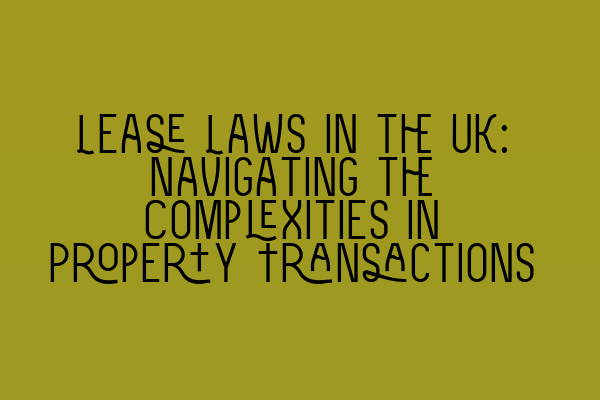Lease Laws in the UK: Navigating the Complexities in Property Transactions
When it comes to property transactions, understanding lease laws in the UK is essential. Whether you are a landlord or a tenant, being well-versed in the complexities of lease agreements is crucial to protect your rights and mitigate potential disputes. In this blog post, we will explore the key aspects of lease laws in the UK and provide valuable insights on how to navigate through them effectively.
The Basics: What is a Lease?
Before diving into the intricacies of lease laws, let’s start with the basics. A lease is a legally binding contract between a landlord (or lessor) and a tenant (or lessee) that grants the tenant the right to occupy a property for a specified period of time. This agreement outlines the rights, obligations, and restrictions of both parties during the tenancy.
Leases can be for residential or commercial properties, each having its own set of regulations. It’s important to note that lease laws are governed by both common law principles and specific legislation, such as the Landlord and Tenant Act 1985 and the Housing Act 1988.
Essential Elements of a Lease Agreement
When entering into a lease agreement, certain elements must be clearly defined to ensure a legally enforceable contract. These elements typically include:
- Names and addresses of both the landlord and tenant
- Description of the property being leased
- Duration of the tenancy
- Terms and conditions, including rent amount and payment schedule
- Repair and maintenance responsibilities
- Termination clauses, including notice periods
It is crucial for both parties to fully understand and agree to these elements before signing the lease agreement. Seeking legal advice from a qualified property solicitor can ensure that your interests are protected and that the agreement complies with all relevant lease laws.
Rights and Responsibilities of Landlords
Landlords have numerous rights and responsibilities under lease laws in the UK. Some key obligations include:
- Providing a safe and habitable living or working environment
- Making necessary repairs and conducting maintenance work
- Protecting the tenant’s deposit in a government-approved scheme
- Providing required safety certificates, such as gas safety certificates
- Respecting the tenant’s right to privacy
Additionally, landlords have the right to receive rent payments on time, to regain possession of the property at the end of the tenancy, and to take legal action if the tenant breaches any terms of the lease agreement.
Rights and Responsibilities of Tenants
Tenants also have certain rights and responsibilities that they must adhere to. These include:
- Paying rent on time and in full
- Keeping the property clean and in good condition
- Notifying the landlord promptly of any necessary repairs
- Allowing the landlord access for inspections or repairs with proper notice
- Respecting the rights of other tenants or neighbors
Tenants have the right to live in a property that is safe and well-maintained. They also have protection against eviction without proper notice or legal grounds. If a landlord fails to fulfill their responsibilities, tenants can take legal action and seek remedies as outlined in lease laws.
Common Lease Disputes and Resolutions
Lease disputes can arise due to various reasons, often leading to strained landlord-tenant relationships. Common disputes include:
- Non-payment of rent
- Breach of lease terms
- Repairs and maintenance issues
- Security deposit disputes
- Eviction-related matters
To resolve these disputes, it is advisable to seek mediation or alternative dispute resolution methods before pursuing costly court proceedings. A skilled property solicitor specializing in lease laws can provide valuable guidance and help negotiate a fair resolution for all parties involved.
It’s worth noting that lease laws are subject to updates and amendments. Staying informed about any changes in the law is essential to ensure compliance and protect your rights. Consulting a knowledgeable property solicitor is the best way to navigate through the complexities of lease laws and ensure a smooth property transaction.
Get Expert Legal Assistance for Lease Matters
When dealing with lease agreements, it’s crucial to have expert legal assistance on your side. At SQE Property Law & Land Law, our team of experienced property solicitors can provide comprehensive advice and representation for all your lease-related needs. Whether you require assistance in drafting or reviewing lease agreements, resolving disputes, or understanding your rights and responsibilities, we are here to help.
Want to test your knowledge on lease laws and property transactions? Take a look at our SQE 1 Practice Exam Questions or SQE 1 Practice Mocks FLK1 FLK2 to sharpen your legal skills. If you’re planning to pursue a career in property law, check out our SQE 2 Preparation Courses and SQE 1 Preparation Courses to enhance your chances of success. Stay updated with the latest SRA SQE exam dates by visiting our page on SRA SQE Exam Dates.
Remember, knowledge is power, and being well-informed about lease laws is crucial for smooth property transactions. Contact SQE Property Law & Land Law today to discuss your lease-related matters and benefit from our expertise in navigating the complexities of lease laws in the UK.
